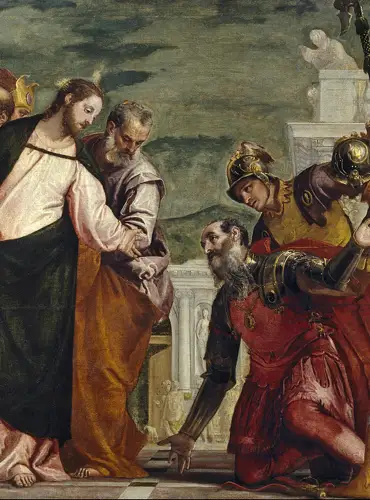Monday of the Twenty-fourth Week in Ordinary Time – Lk 7:1-10
Today’s Gospel presents us with the figure of the centurion who approaches Jesus and asks that his servant be healed. There are two things that catch our attention: first, we have the centurion’s great love for his servant; it’s amazing, first, that the centurion “holds his slave in esteem,” at all, and, second, that he asks for Jesus’ help. Masters had complete control over their slaves, who were considered simply another piece of property to be thrown out if they weren’t useful. As one Roman writer put it, the instruments of agriculture could be divided into three classes: the articulate, the inarticulate, and the mute: “the articulate comprising the slaves, the inarticulate comprising the cattle, and the mute comprising the vehicles.” For the Romans, then, the only difference between a slave and a beast or a cart was that the slave could speak. The second thing that calls our attention is that there are only two times in the Bible where Jesus is said to marvel, ἐθαύμασεν (ethaumasen), and both times it concerns faith: here, at the great faith of the centurion, who was almost certainly a pagan, and in Mk 6:6, when He had returned to His native place and was “amazed at their lack of faith.”
What does this mean for us? On one hand, it reminds of the great effect that our prayers can have. The sick slave couldn’t do anything for himself; it was his master who asked, first, for the intercession of the elders and, second, for the intercession of his friends. His pleading on behalf of his slave was heard because of his insistence and humility. Indeed, the centurion received more than he could have hoped for, since Jesus actually went to see him, and the slave wasn’t simply cured of his illness, but rather was “in good health,” meaning the miracle had completely restored him. He wasn’t just “ok,” but rather made new.
We can also learn from Christ’s marvel at the centurion’s faith. Saint Augustine comments how odd it is that the Jews, who have been given everything, would have less faith than the centurion. But this could also be the case in our lives: sometimes we get used to the every-day miracles of the Eucharist, God’s graces, our perseverance, when really none of these things should be ignored or forgotten. We can just “get used” to having God there, and forget what a huge blessing and a strength that really is. We can ask ourselves: how firmly and faithfully do we pray for the conversion of sinners, especially those in our families? How much do we trust in God’s goodness and love for us? Do we approach Christ in all humility, believing that “prayer is the place of refuge for every worry, a foundation for cheerfulness, a source of constant happiness, a protection against sadness,” as Saint John Chrysostom said?
Let us ask, through the intercession of Mary, Our Lady of Hope, to take advantage of moments of difficulty and challenges to grow in our faith and love for Her Divine Son.





